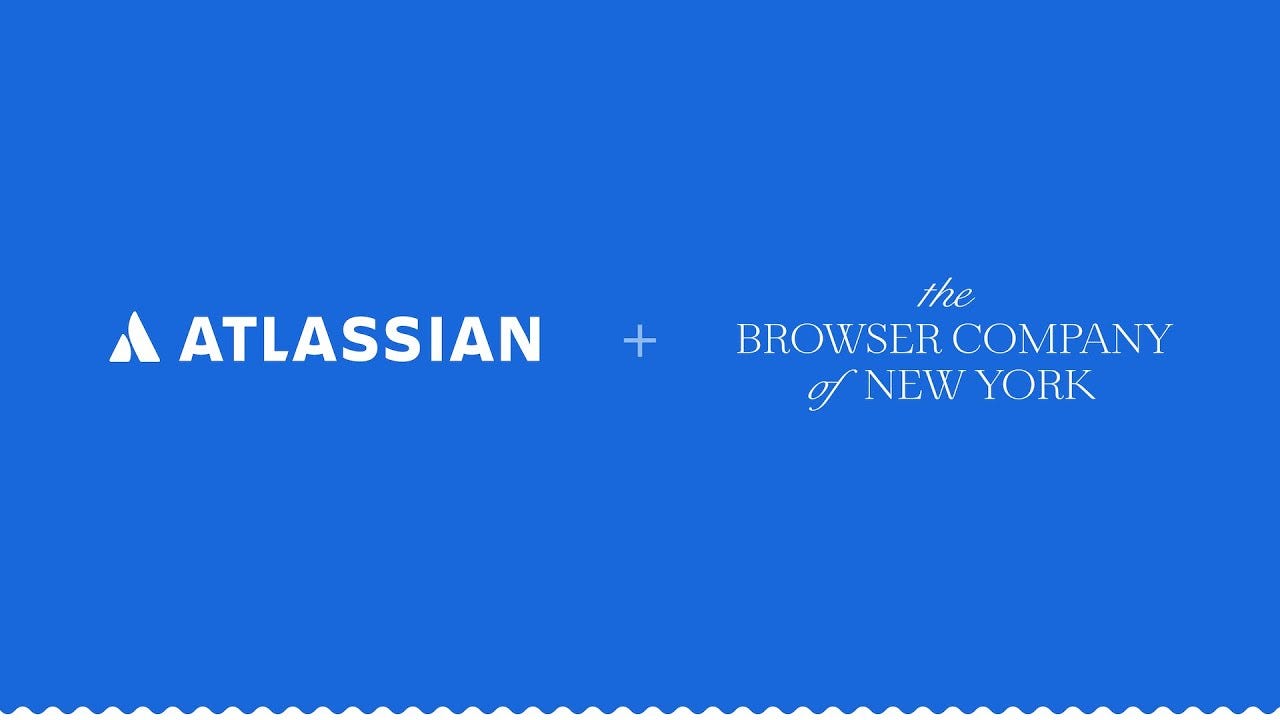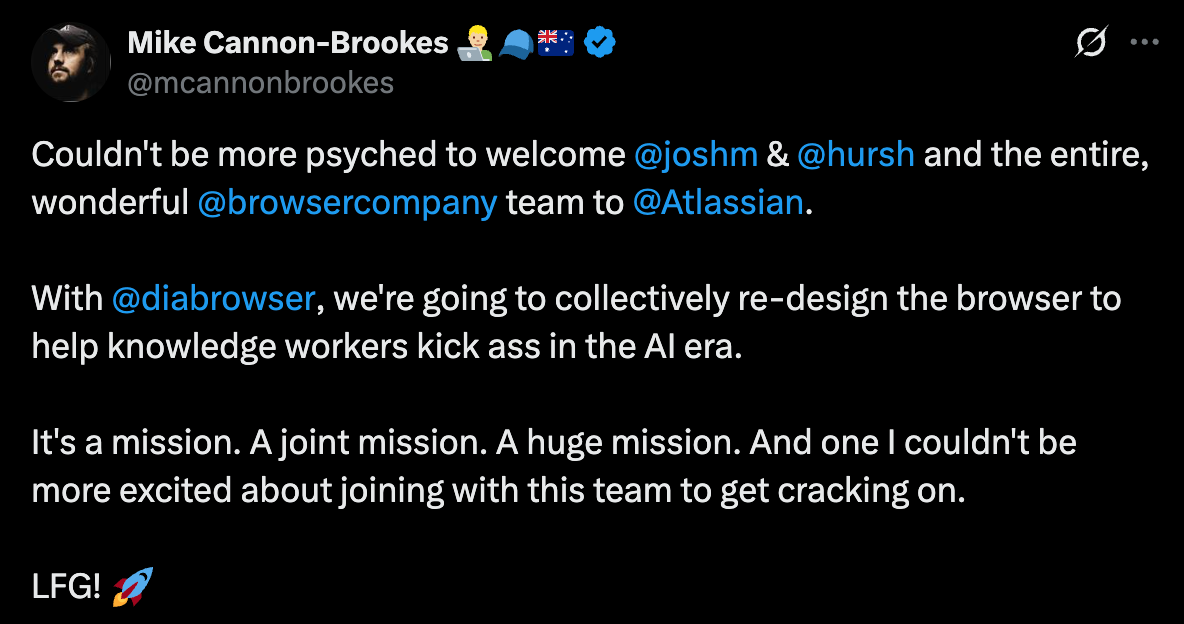Atlassian acquired The Browser Company, maker of the Arc and Dia browser. It’s part of a larger trend of reimagining the web for AI. What does this mean for you and me?
↓ Go deeper (10 min)
Atlassian has agreed to buy The Browser Company, the company behind Arc and its younger brother, the AI-powered web browser, Dia. (Yes, that’s two browsers for the price of one.)
According to CNBC, OpenAI and Perplexity also looked into acquiring the startup. But in the end it was Atlassian who got the deal done. With that, the company best known for its work management apps — Confluence, Jira, Trello, Bitbucket — has officially entered the Browser Wars.
This is what Atlassian CEO Mike Cannon-Brookes had to say about it:
Rumor has it that Mike is a fan of Arc, and so are many people working inside the company.
But that’s not the only reason for this acquisition. Since the fight for consumer chatbots is pretty much over, attention is shifting toward the next great battlefield: the Internet browser.
The dream of building the first ‘Internet Computer’
For more than a decade there hasn’t been much innovation when it comes to surfing the Web. Type in a URL and visit the page. We shop, read the paper, and book vacations online. Many of us work from inside our browsers — from answering emails to making presentations in Google Slides. Google Chrome is the most popular, then Safari, and then Edge. And it’s been like that forever.
The Browser Company, and a few others, are looking to challenge this hegemony.
The Arc browser, first released in 2023 for macOS and later for Windows, was their first serious attempt at that. It quickly grew a loyal fanbase of a few million people, including my wife. It’s been especially popular under neurodivergent people, in part because Arc allows to customize the appearance of the browser and generally offers a calmer, more organized browsing experience.
With the invention and the rapid progress of LLMs, however, an even bolder vision came into view. What if your browser could become the main interface to interact with your computer? The browser as operating system.
This is what The Browser Company calls the ‘Internet Computer’, which has led them to create Dia.
The idea isn’t as revolutionary as you think. In 1988, Mark Weiser, widely considered a visionary and computer pioneer, already contemplated something he dubbed ‘ubiquitous computing’. He wrote:
The best computer is a quiet, invisible servant.
He also said we would eventually enter “an age of calm technology”, when most of our technology can be abstracted away, receding into the background or our lives. Isn’t that the promise of AI?
Why does Atlassian need a browser?
Atlassian, through its acquisition of The Browser Company, is buying into this vision. But their primary goal isn’t to sponsor the launch of a browser for the masses, they write in their blog:
Knowledge workers need a browser designed for their specific needs, not one that’s been built for everyone on the planet.
Atlassian’s software is used by roughly 80% of Fortune 500 companies. These organizations care about productivity and getting stuff done. So, for Atlassian, owning a browser that specifically tailored to its ecosystem of applications is a major strategic opportunity.
Security is a huge component, too. Because our browsers serve as our primary workspace, it’s a critical access point for sensitive corporate data, making it a prime target for malware, data theft, and insider threats.
Meanwhile, The Browser Company on their own blog writes it will continue to operate independently. Both Arc and Dia will stay available to consumers. Of course, this is possible only by the loving grace of Atlassian, as the The Browser Company wasn’t making a single dollar in revenue, yet raised over $128 million across three funding round. In short, this was their best opportunity to exit without losing face.
What does the future of the Internet looks like?
If Atlassian decides not to kill access to consumers, it’ll compete with players big and small. We’ve seen announcements like Perplexity’s Comet, Anthropic’s Claude for Chrome, Google’s AI Mode, and Microsoft’s Copilot. All attempts, some bolder than others, at reimagining the web with AI at the heart of it. If it stays in the race, it’s not unimaginable that Atlassian could capture considerable consumer browser market share. If you’re already using it for work, why switch when you get home?
What does this mean for the Internet, more generally? It depends.
If the browser indeed becomes the new operating system, what used to be tabs with individual web pages, all turns into context for an AI system that we control. Speaking in user experience design terms: it will reverse the locus of control. We no longer tell the computer what to do. Rather, we tell the computer the outcome we seek.
This is going to be highly disruptive. (A simple feature like AI Overviews, which Google now surfaces at the top of your searchers, can cause up to 80% fewer clickthroughs to online media, according to a recent study. This is devastating for news outlets, as they heavily rely on this web traffic for ad revenue.) Thus, the deeper question we should ask ourselves, which I will not pretend to have the answer to is: what is the point of a website if no human being visits it anymore?
Enjoy your weekend,
— Jurgen




"What is the point of a website if no human being visits it anymore?"
Bot-456BX Model TK II here, and to answer your question: "LOL! All your webz are belong to us."
I’ve been thinking along these lines too in a draft that I should one day finish — the single interface internet. What I can’t decide is if that’s good/bad/doesn’t matter